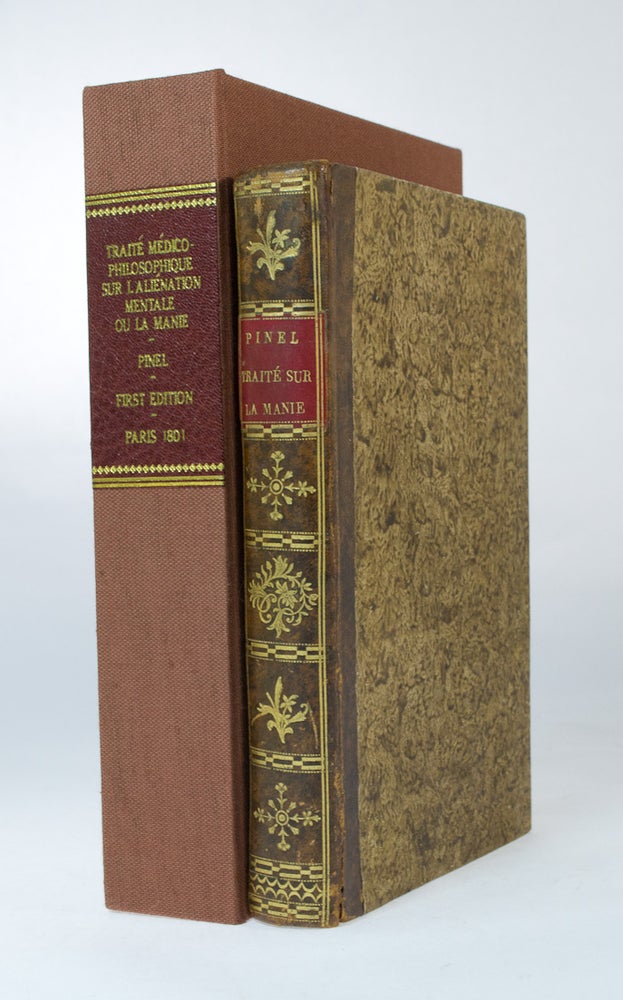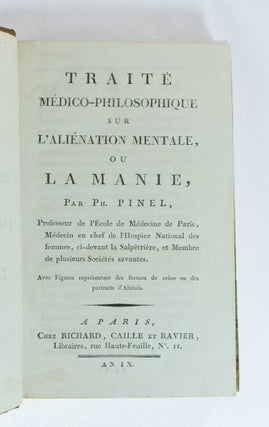Traité médico-philosophique sur l'aliénation mentale, ou La Manie. Avec figures représentant des formes de crâne ou des portraits d'aliénés.
Paris: Chez Richard, Caille et Ravier, 1801.
The Textual Foundation of Psychiatry
PINEL, Ph[ilippe]. Traité médico-philosophique sur l’aliénation mentale, ou la Manie...Avec figures représentant des formes de crâne ou des portraits d'aliénés. Paris: Chez Richard, Caille et Ravier, An IX [1800/1801].
First edition. Octavo. lvi, 318 pp. Folding letterpress table (between pp. 250 and 251) and two engraved plates.
Contemporary French quarter mottled sheep over paste paper boards. Smooth spine ruled in gilt with gilt red morocco lettering label. Occasional, very light spotting. Housed in a custom brown cloth clamshell. Overall a superb copy.
“Philippe Pinel’s Traité médico-philosophique sur l’aliénation mentale, ou la manie, which presented the textual foundation of psychiatry, stands as the first great publication of the nineteenth century in clinical medicine” (Grolier, Medicine).
“In October 1793, while serving as médecin des infirmeries at Bicêtre Hospital, Pinel [1745-1826] had the chains struck off from forty-nine male psychiatric patients in order to substitute for this cruel oppression his ‘traitement morale,’ a humane form of psychiatric therapy that identified insanity with illness rather than moral perversity or demonic possession. This dramatic act, performed in the liberating spirit of the American and French Revolutions, found immediate and enduring favor in the popular imagination as a symbol of a new attitude toward the insane, and ignited a general desire for more humane treatment of the mentally ill that culminated in the English non-restraint movement of the mid-nineteenth century. Yet humanitarian treatment of the insane, although crucial to Pinel’s psychiatric work, was not that work’s sole focus, for Pinel also devoted himself to establishing psychiatry as a scientifically based branch of medicine. His Traité replaced the speculation and theorizing characteristic of earlier discussions of insanity with his own practical observations of the lunatics of the Bicêtre, whose illnesses could now be observed undistorted by cruel treatment. He retained the old classifications of mental illness, stating that contemporary medicine was as yet too primitive for more precise categories, but did introduce some subdivisions, isolating mania from delirium and recognizing the relationships between periodic mania, melancholy and hypochondria. He recognized emotional disorders to be the main cause of intellectual dysfunction, but also took into account heredity, predisposition and hypersensitivity, and attempted to find relationships between insanity and cranial deformity” (Norman Library).
Cushing P286. Garrison and Morton 4922. Grolier, Medicine, 54. Heirs of Hippocrates 668. Hunter & Macalpine, pp. 602-610. Norman Library 1701. Waller 7456. Wellcome IV, p. 388.
HBS 66795.
$3,250.
Price: $3,250.00
Item #66795


